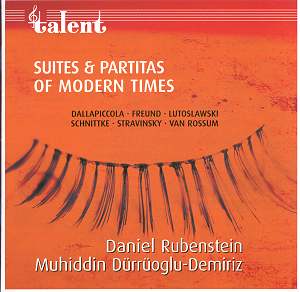In his booklet notes
for this CD, Jean-Pierre Mévisse
summarises the different styles to be
found in the 20th century
as 'eclecticism', by which is meant the gathering together of
existing elements, rather than the construction of new systems.
The choices composers make when they deliberately refer to past
models can also have a variety of reasons, but the emphasis here
is on unity -
the legacy of music from the Baroque
era being the central thread which links
the pieces in this programme.
Stravinsky's Suite
Italienne relates closely to the 'Pulcinella' suite, derived from
themes by (or attributed to) Pergolesi.
Stravinsky had transcribed this work
for violin and piano in 1925, and it
was only after working on another transcription
for cello and piano that, in collaboration
with Samuel Duskhin, this suite was
created, with an extra Scherzino
movement. Rubenstein and Demiriz's
performance is a very good one, but
the question of balance crops up immediately.
The violin is very forward in relation
to the piano, so that moments in which
the violin is placed in an accompanying
role work poorly. It is as well that
Daniel Rubenstein's admirable technique
can shine through this spotlighting,
but it is a shame that there isn't just
a little more air around the violin.
The opening Introduzione movement could have been a touch
more sprightly - having a lightness of touch with this
duo that I like, but in a stately tempo
which slightly contradicts this approach.
The mix of lines in the Tarantella
is once again disadvantaged through
the balance, but the lyrical lines of
the Serenata and Govotta movements
are graceful and nicely phrased. I'm
not so sure the little gap between theme
and cadence each time in the Minuetto
isn't just a bit mannered, but in
general there are more pluses that minuses
to this performance, which ends with
appropriate joie de vivre.
Despite his serial
tendencies, much of Luigi Dallapiccola's
chamber work is highly approachable.
He wrote this Tartiniana - a
suite written in honour of Giuseppe
Tartini, while teaching composition
at Berkshire Music Center in Tanglewood.
The virtuoso nature of the violin part
is a significant element in this work,
but Tartini's own melodies are recognisable,
though treated to various kinds of counterpoint
and contrasts of mood.
Frederic van Rossum's
Graffiti compress a great deal
of material into a relatively short
tripartite form. The title refers to
the graphic and chiselled nature of
the musical language employed, but there
is little of difficulty for the listener.
Echoes of Stravinsky pop through now
and again, and the writing, while concise
and concentrated, is conventional and
easily digested, with a Sarabande rhythm
appearing in the central section.
Schnittke's Suite
im Alten Style has of course appeared
before, but more usually in all-Schnittke
programmes, where its uncompromising,
almost naïve simplicity can prove
disorientating. Without forgetting that
Schnittke's personal style had been
outlawed in the Soviet Union at this
time, in this programme it sits neatly
between works of a comparable nature,
and receives a sensitive performance
as a jewel of the repertoire. It appears
as less an enigmatic work filled with
coded secrets, as a respectful bow to
traditions without which our contemporary
music world would be entirely different.
There is just that striking minor-second
double-stop (oh, that resolution!) in
the final Pantomime to remind
us that there is a modern voice
screaming to be allowed to speak.
Witold Lutoslawski's
Partita was written for Pinchas
Zukerman and pianist Marc Neikrug and
later transcribed by the composer for
violin and orchestra at the request
of Anne-Sophie Mutter. The title refers
of course to the pre-classical tradition
of keyboard music, and the rhythmic
elements in the opening Allegro giusto
refer to elements of gigue and allemande
styles. The musical style is however
entirely Lutoslawski's own, with a great
deal of independence in each part, ad
libitum intermezzi between the main
movements, and a dramatic impression
which has kept this work a central part
of contemporary violin repertoire.
The final work in this
impressive programme is Sonapartita
by the Pittsburgh-born composer
Don Freund, written for this duo's programme
of new music for violin and piano inspired
by a Baroque ancestry. Freund contributes
his own programme note, helpfully pointing
out the extensive musical references
to Bach, and other modern composers
like Lukas Foss and Stravinsky for whom
such a resource has also been important.
The title is a tribute to 'Nach Bach',
a harpsichord piece by Georges Rochburg,
and the third movement Presto is
an exact replica of the final movement
of J.S. Bach's G minor Sonata for solo
violin with piano bits added. Other
elements are derived from ancient dance
forms and echoes of the composers "life-long
immersion in the music of Bach."
This well-filled CD
has top performances by this duo, whose
musical pedigree has already been proven
on the international competition circuit.
As mentioned previously, the balance
in favour of the violin proves somewhat
tiring on this recording, but this should
not take too much away from some imaginative
programming and imposing performances.
Dominy Clements


